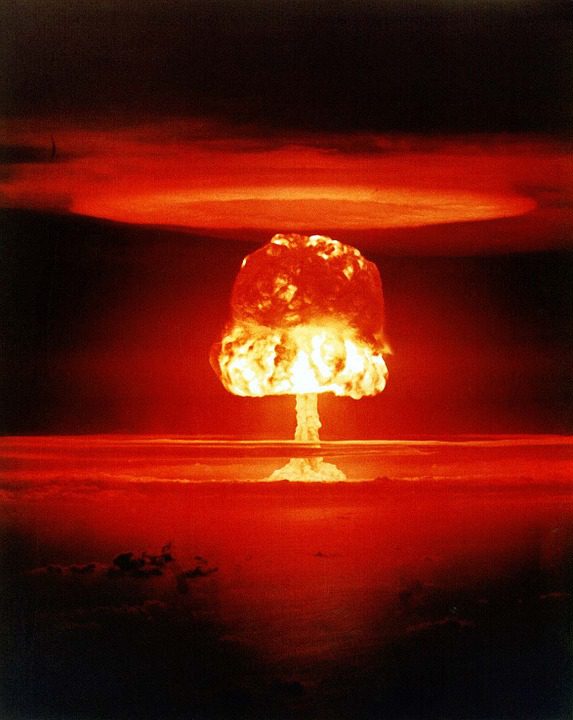(vs. Deacon Jim Russell)

Image uploaded by “geralt” [Pixabay / CC0 public domain]
*****
Words of my friend, Deacon Jim Russell, will be in blue. This is part of a lengthy Facebook discussion underneath my collection of my papers on the issue, with many participants.
***
Dave–I’ve been reading a lot of the recent posting on this question. I don’t see much attention paid to CCC 2309 (below) and its clear concluding statement: “The evaluation of these conditions for moral legitimacy belongs to the prudential judgment of those who have responsibility for the common good.”
So, regarding what the Church teaches us, we are taught that it is those who have responsibility for the common good who must make this prudential judgment. And I believe this is precisely why the magisterium does not weigh in on specific instances in which “moral legitimacy” is in question. Ultimately, it is not up to the magisterium–or us–to second-guess the incredibly weighty decisions made by those responsible for the common good.
I am not personally convinced that the Church’s magisterium places the bombing of Hiroshima and Nagasaki beyond the realm of moral legitimacy. That is, I’m still convinced that the magisterium permits faithful Catholics to disagree on such a question. The key question is, of course, whether this was an “indiscriminate” attack on non-combatant civilian populations–I don’t think the historical evidence is at all crystal-clear on this.
Ever read “A Song for Nagasaki” (Ignatius), about Takashi Nagai and his experience as a Catholic convert during and after the bomb? Very intriguing read. Particularly, as I recall, in regard to some of the details of daily life under the Japanese govt. and how, after the leafleting of the city warning the population to leave, civilians not essential to the ongoing industrial work for the war effort were sent from the city while others were compelled to stay for the sake of the war effort. The blurring of “combatant” and “non-combatant” plays a huge role in the moral calculus here. As does the fact that the US did make an effort to warn populations to leave–while the Japanese govt. compelled populations to stay. In any case, more food for thought. God bless.
CCC 2309:
The strict conditions for legitimate defense by military force require rigorous consideration. The gravity of such a decision makes it subject to rigorous conditions of moral legitimacy. At one and the same time:
– the damage inflicted by the aggressor on the nation or community of nations must be lasting, grave, and certain;
– all other means of putting an end to it must have been shown to be impractical or ineffective;
– there must be serious prospects of success;
– the use of arms must not produce evils and disorders graver than the evil to be eliminated. The power of modem means of destruction weighs very heavily in evaluating this condition.
These are the traditional elements enumerated in what is called the “just war” doctrine.
The evaluation of these conditions for moral legitimacy belongs to the prudential judgment of those who have responsibility for the common good.
I respect your opinion, and especially the fact that you could express it without rancor. I actually hope you are right, but I’m not persuaded at this juncture.
As I’m seeing it, the key question is about combatants and non-combatants. So one could start unpacking this by asking: Is a combatant only someone who attacks you with a weapon, or does it include, for example, soldiers who serve in communications, engineering, espionage, etc.?
As I have asked a few people now (with no answer): does “combatant” include the two-year-old children in Hiroshima and Nagasaki, the 95-year-old woman, the handicapped and mentally ill? How about babies in the womb who were also killed?
No–and it wouldn’t include our own POWs, as well–but does “non-combatant” include the civilian population who either willingly stayed or were compelled to stay in the cities for the sake of the industrial support of the war effort?
If it was willing, I could see that they could be included in the war effort; compelled? No . . . I would agree with a wide conception of “military”: as you say: “communications, engineering, espionage, etc.” They are in the war effort and are fair game.
But I don’t see how your case can stand if you concede that there were multiple thousands of true innocents killed: babies, etc. How can this possibly be defended? It’s indiscriminate slaughter: precisely as Vatican II condemned.
Targeting military installations, with “collateral damage” is entirely different. There is no will there to kill civilians, and it is regretted that any are killed. Every effort is made to minimize those undesired casualties.
Here, it was and is desired: we wanted to kill as many Japs as we could (military or no): men, women, children . . . It can’t be defended, it seems to me: not on grounds of situation ethics, or consequentialism, or “tooth for a tooth” . . . We became immoral like our enemies when we did these things.
***
What is intrinsically wrong, is so regardless of circumstances.
Except that is the thing being considered–whether the dropping of the A-bombs on Hiroshima and Nagasaki should be counted as intrinsically wrong.
I was simply noting that all these consequentialist arguments [made by others in the thread] are irrelevant if indeed we are talking about an intrinsic wrong. As I read the Church documents, and statements from Pope St. John Paul II, Paul VI, etc., I don’t see any other interpretation that makes sense. What are we to make of the following statements?:
Pope St. John Paul II called the bombings “true genocide”:
We cannot forget that your country is one of the symbols of peace, as you have just emphasized, since the cities of Hiroshima and Nagasaki are a message to all our contemporaries, inviting all the earth’s peoples to learn the lessons of history and to work for peace with ever greater determination. Indeed, they remind our contemporaries of all the crimes committed during the Second World War against civilian populations, crimes and acts of true genocide which we thought were for ever in the past but are still being perpetrated in various parts of the world. In order not to forget the atrocities of the past, it is important to teach the younger generation the incomparable value of peace between individuals and peoples, because the culture of peace is contagious but is far from having spread everywhere in the world, as is demonstrated by persistent situations of conflict. We must constantly repeat that peace is the essential principle of common life in all societies.
(HOLY FATHER’S ADDRESS TO THE JAPANESE AMBASSADOR TO THE HOLY SEE, Castel Gandolfo, 11 September 1999)
Pope Paul VI called it “butchery of untold magnitude”:
MESSAGE OF HIS HOLINESS
POPE PAUL VI
FOR THE CELEBRATION OF THE
DAY OF PEACE1 JANUARY 1976
“THE REAL WEAPONS OF PEACE”
. . . If the consciousness of universal brotherhood truly penetrates into the hearts of men, will they still need to arm themselves to the point of becoming blind and fanatic killers of their brethren who in themselves are innocent, and of perpetrating, as a contribution to Peace, butchery of untold magnitude, as at Hiroshima on 6 August 1945?” . . .
This indicates to me that both popes certainly applied as “indiscriminate” the bombings of Hiroshima and Nagasaki. Thus, these are in effect, interpretations / applications of the strong condemning language of Vatican II.
These can in my view be understood to be the deeply held prudential judgments of these two pontiffs. But these statements do not come to us in the form of teaching documents that somehow bind the consciences of all faithful Catholics on this specific question. The statements you’ve quoted certainly give great support for Catholics who do concur with them, but I don’t see how they could be construed to eliminate the possibility of other prudential views.
So you agree that these two popes thought the bombings were intrinsically immoral and examples of what Vatican II construed as ‘indiscriminate bombing”? Someone else was arguing that they might not be classed as “indiscriminate.”
If the argument is (as I’ve been told many times in this thread and others) “that is just your opinion about Church teaching” (Vatican II documents are teaching documents), then I appeal to popes, who are as good interpreters as any, whether or not their expressed opinions were technically magisterial or not. This was their opinion. I agree with the opinion. And it is always good ground to agree with popes, all things considered.
This also raises the question of whether these two popes (considering it apart from magisterium / authority issues) could be so massively wrong as to not understand that what we have here is not intrinsically wrong. These are rather basic Catholic ethical distinctions. If they were wrong, they were massively so (and quite ignorant), and I just don’t find that plausible.
I appreciate the discussion–to be clear, I’m not personally certain of either view at this point, but my thinking thus far is that there remains room in Catholic teaching for both views, largely because the only ones with the full and complete “real-time” perspective on the question are those responsible for the common good (CCC 2309)–meaning it’s up to them to have gotten it right–or wrong. In hindsight, we’re trying to judge something they had to do–and presumably did do with the best of all intentions. But even if they got it tragically wrong, I think we have to presume that those who made the decision were doing everything they could to make a rightly moral decision. God bless and thanks again.
I agree with your next-to-last sentence, as I reiterated again recently to my friend Paul Hoffer, and did in the initial debate of 2005.
I, too, am grateful that we (all of us) are able to have the discussion on a highly-charged, emotional issue, without the asinine silliness and acrimony that characterized the discussion on waterboarding in late 2014.
I commend everyone on both sides of the issue for their good behavior and for refraining from personal attacks. It proves once again that it can be done. I’m very proud o’ ya!
***
Along these lines, regarding the “magisterial” question, I wrote in 2005:
That’s not to say that this view is a settled dogma in the Catholic Church (I have approached this matter as an ethical one, not a dogmatic one, which is a different level of discussion altogether). . . .
I’m not brash enough to think that my own bald opinion on such a momentous matter is enough to persuade or carry any weight with anyone. Therefore, I cite scholars and leading figures in the Church. There is nothing wrong in citing people who have more knowledge and expertise on a subject.
One can distinguish between:
1) Making a strong assertion about some Catholic teaching as a matter of one’s own opinion.
And:
2) Making out that this opinion is dogmatic Catholic teaching with regard to the particular under consideration and that no one can possibly disagree.
Karl Keating wrote:
The atomic bombings of Nagasaki and Hiroshima, like the fire bombings of Dresden and other German cities, cannot be squared with Catholic moral principles because the bombings deliberately targeted non-combatants.
I think this can easily be interpreted as an instance of #1 and not #2. Perhaps it could have been worded better (as is usually the case with almost all writing), but I don’t think he was being “dogmatic”. The same applies to the Catholic Answers Guide. To state one’s opinion (even if strongly held) that a certain Catholic principle was violated in Instance X is not the same as asserting that one’s opinion on the matter is itself magisterial and unable to be dissented against without being a lousy Catholic.
*****
Meta Description: Congenial debate with Deacon Jim Russell about whether the nuclear bombing of Japan is harmonious with Catholic social teaching & morality.
Meta Keywords: nuclear war, nuclear ethics, just war theory, attacking civilians, Hiroshima, Nagasaki, World War II, ethics in warfare, Catholic social teaching, bombing of cities, nuclear bombing of Japan, Catholic morality, mass murder, terrorist attacks













